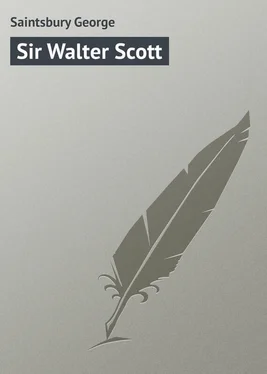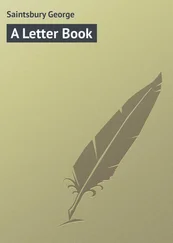George Saintsbury - Sir Walter Scott
Здесь есть возможность читать онлайн «George Saintsbury - Sir Walter Scott» — ознакомительный отрывок электронной книги совершенно бесплатно, а после прочтения отрывка купить полную версию. В некоторых случаях можно слушать аудио, скачать через торрент в формате fb2 и присутствует краткое содержание. Жанр: foreign_prose, на английском языке. Описание произведения, (предисловие) а так же отзывы посетителей доступны на портале библиотеки ЛибКат.
- Название:Sir Walter Scott
- Автор:
- Жанр:
- Год:неизвестен
- ISBN:нет данных
- Рейтинг книги:5 / 5. Голосов: 1
-
Избранное:Добавить в избранное
- Отзывы:
-
Ваша оценка:
- 100
- 1
- 2
- 3
- 4
- 5
Sir Walter Scott: краткое содержание, описание и аннотация
Предлагаем к чтению аннотацию, описание, краткое содержание или предисловие (зависит от того, что написал сам автор книги «Sir Walter Scott»). Если вы не нашли необходимую информацию о книге — напишите в комментариях, мы постараемся отыскать её.
Sir Walter Scott — читать онлайн ознакомительный отрывок
Ниже представлен текст книги, разбитый по страницам. Система сохранения места последней прочитанной страницы, позволяет с удобством читать онлайн бесплатно книгу «Sir Walter Scott», без необходимости каждый раз заново искать на чём Вы остановились. Поставьте закладку, и сможете в любой момент перейти на страницу, на которой закончили чтение.
Интервал:
Закладка:
Therefore I shall maintain that though the most excellent way of all might have been to record his alterations, and the original, in an appendix-dustbin of apparatus criticus , Scott was right, and trebly right, in such dealing as that with the first stanza of 'Fause Foodrage,' which I have quoted and praised. That stanza, as it stands above, does not occur in any of the extant quasi-originals. 'Mrs. Brown's MS.,' from which, as Professor Child says, with almost silent reproach, Scott took his text, 'with some forty small changes,' reads —
'King Easter has courted her for her gowd,
King Wester for her fee,
King Honour for her lands sae braid,
And for her fair bodie.'
Now this is clearly wrong. Either 'gowd' or 'lands' is a mere repetition of 'fee,' and if not, 10 10 It is quite possible that Mrs. Brown's illiterate authority, or one of his predecessors in title, took 'fee' in the third sense of 'cattle.'
the reading does not point any ethical antithesis between Kings Easter and Wester and their more chivalrous rival. As it happens, there are two other versions, shorter and less dramatic, but one of them distinctly giving, the other implying, the sense of Scott's alteration. Therefore I say that Scott was fully justified in adjusting the one text that he did print, especially as he did it in his own right way, and not in the wrong one of Percy and Mickle. There is here no Bentleian impertinence, no gratuitous meddling with the at least possibly genuine text of a known and definite author. The editor simply picks out of the mud, and wipes clean, something precious, which has been defaced by bad usage, and has become masterless.
The third volume of the Minstrelsy was pretty speedily got ready, with more matter; and Sir Tristrem (which is in a way a fourth) was not very long in following. This last part contained a tour de force in the shape of a completion of the missing part by Scott himself, a completion which, of course, shocks philologists, but which was certainly never written for them, and possesses its own value for others.
Not the least part of the interest of the Minstrelsy itself was the editor's appearance as a prose-writer. Percy had started, and others down to Ritson had continued, the practice of interspersing verse collections with dissertations in prose; and while the first volume of the Minstrelsy contained a long general introduction of more than a hundred pages, and most of the ballads had separate prefaces of more or less length, the preface to 'Young Tamlane' turned itself into a disquisition on fairy lore, which, being printed in small type, is probably not much shorter than the general introduction. In these pieces (the Fairy essay is said to be based on information partly furnished by Leyden) all the well-known characteristics of Scott's prose style appear – its occasional incorrectness, from the strictly scholastic point of view, as well as its far more than counterbalancing merits of vivid presentation, of arrangement, not orderly in appearance but curiously effective in result, of multifarious facts and reading, of the bold pictorial vigour of its narrative, of its pleasant humour, and its incessant variety.
Nor was this the only opportunity for exercising himself in the medium which, even more than verse, was to be his, that the earliest years of the century afforded to Scott. The Edinburgh Review , as everybody knows, was started in 1802. Although its politics were not Scott's, they were for some years much less violently put forward and exclusively enforced than was the case later; indeed, the Whig Review started with much the same ostensible policy as the Whig Deliverer a century before, the policy, at least in declared intention, of using both parties as far as might be for the public good. The attempt, if made bona fide , was not more successful in one case than in the other; but it at least permitted Tories to enlist under the blue-and-yellow banner. The standard-bearer, Jeffrey, moreover, was a very old, an intimate, and a never-quite-to-be-divorced friend of Scott's. At a later period, Scott's contributions to periodicals attained an excellence which has been obscured by the fame of the poems and novels together, even more unjustly than the poems have been obscured by the novels alone. His reviews at this time on Southey's Amadis , on Godwin's Chaucer , on Ellis's Specimens , etc., are a little crude and amateurish, especially in the direction (well known, to those who have ever had to do with editing, as a besetting sin of novices) of substituting a mere account of the book, with a few expressions of like and dislike, for a grasped and reasoned criticism of it. But this is far less peculiar to them than those who have not read the early numbers of the great reviews may suppose. The fact is that Jeffrey himself, Sydney Smith, Scott, and others were only feeling for the principles and practice of reviewing, as they themselves later, and the brilliant second generation of Carlyle and Macaulay, De Quincey and Lockhart, were to carry it out. Perhaps the very best specimens of Scott's powers in this direction are the prefaces which he contributed much later and gratuitously to John Ballantyne's Novelists' Library – things which hardly yield to Johnson's Lives as examples of the combined arts of criticism and biography. At the time of which we speak he was 'making himself' in this direction as in others. I hope that Jeffrey and not he was responsible for a fling at Mary Woollstonecraft in the Godwin article, which would have been ungenerous in any case, and which in this was unpardonable. But there is nothing else to object to, and the Amadis review in particular is a very interesting one.
We must now look back a little, so as to give a brief sketch of Scott's domestic life, from his marriage until the publication of The Lay of the Last Minstrel , which, with that of Waverley and the crash of 1825-26, supplies the three turning-points of his career. After a very brief sojourn in lodgings (where the landlady was shocked at Mrs. Scott's habit of sitting constantly in her drawing-room), the young couple took up their abode in South Castle Street. Hence, not very long afterwards, they moved to the house – the famous No. 39 – in the northern division of the same street, which continued to be her home for the rest of her Edinburgh life, and Scott's so long as he could afford a house in Edinburgh. Their first child was born on the 14th of October 1798, but did not live many hours. As was (and for the matter of that is) much more customary with Edinburgh residents, even of moderate means, than it has been for at least a century with Londoners, Scott, while his own income was still very modest, took a cottage at Lasswade in the neighbourhood. Here he lived during the summer for years; and in March 1799 he and his wife went to London, for the first time in his case since he had been almost a baby. His father died during this visit, after a painful breakdown, which is said to have suggested the touching particulars of the deathbed of Chrystal Croftangry's benefactor (not 'the elder Croftangry,' as is said in a letter quoted by Lockhart), and was repeated to some extent in Scott's own case.
His appointment to the Sheriff[depute]ship of Selkirkshire was made in December 1799, and gave, for light work, three hundred a year. It need not have interfered with even an active practice at the Bar had such fallen to him, and at first did not impose on him even a partial residence. The Lord-Lieutenant, however, Lord Napier of Ettrick, insisted on this, and though Scott rather resented a strictness which seems not to have been universal, he had to comply. He did not, however, do so at once, and during the last year of the century and its two successors, Lasswade and Castle Street were Scott's habitats, with various radiations; while in the spring of 1803 he and Mrs. Scott repeated their visit to London and extended it to Oxford. It is not surprising to read his confession in sad days, a quarter of a century later, of the 'ecstatic feeling' with which he first saw this, the place in all the island which was his spiritual home. The same year saw the alarm of invasion which followed the resumption of hostilities after the armistice of Amiens; and Scott's attention to his quartermastership, which he still held, seems to have given Lord Napier the idea that he was devoting himself, not only tam Marti quam Mercurio , but to Mars rather at Mercury's expense. 11 11 He wrote for his corps the 'War Song of the Edinburgh Light Dragoons,' which appeared in the Scots Magazine for 1802, but was written earlier. It is good, but not so good as it would have been a few years later.
Scott, however, was never fond of being dictated to, and he and his wife were still at Lasswade when the Wordsworths visited them in the autumn, though Scott accompanied them to his sheriffdom on their way back to Westmoreland. He had not yet wholly given up practice, and though its rewards were not munificent, they reached about this time, it would seem, their maximum sum of £218, which, in the days of his fairy-money, he must often have earned by a single morning's work.
Интервал:
Закладка:
Похожие книги на «Sir Walter Scott»
Представляем Вашему вниманию похожие книги на «Sir Walter Scott» списком для выбора. Мы отобрали схожую по названию и смыслу литературу в надежде предоставить читателям больше вариантов отыскать новые, интересные, ещё непрочитанные произведения.
Обсуждение, отзывы о книге «Sir Walter Scott» и просто собственные мнения читателей. Оставьте ваши комментарии, напишите, что Вы думаете о произведении, его смысле или главных героях. Укажите что конкретно понравилось, а что нет, и почему Вы так считаете.












